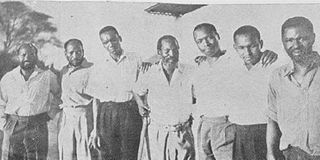Premium
After 63 years, can Kanu be ‘undead’?

Daniel Moi (third right) with Kapenguria Six members Jomo Kenyatta (centre), Paul Ngei, Kung’u Karumba, Bildad Kaggia, Achieng’ Oneko and Fred Kubai. They were members of the Kenya African Union that later rebranded to Kanu.
Next week will be an important anniversary that will pass without being marked or remarked on. May 14 will be the 63rd anniversary of Kenya’s independence party, Kenya African National Union (Kanu).
Formed in May 1960, when the Kenya African Union (KAU) merged with Kenya Independence Movement (KIM) and Nairobi People’s Convention Party (NPCP), Kanu had a run of 38 years as the ruling party—first under Founding Father Jomo Kenyatta up to his death in 1978, then under his successor Daniel arap Moi. Moi stepped down at the end of 2002 and Kanu was trounced at the polls that December.
With every electoral cycle, Kanu has sunk further into oblivion. This problem is not unique to Kanu; it has been the fate of all independence parties in Africa. Uganda Peoples’ Congress (UPC) has withered to near-Kanu levels following its second ouster from power by the army in 1985.
Tanzania’s independence party, in its iteration as Chama Cha Mapunduzi (CCM, or Party of Revolution), has thrived. But it’s most likely because it is East Africa’s and Africa’s longest-continuously ruling party, clocking 62 years in power. Should CCM lose control, it, too, is unlikely to survive.
Nevertheless, even if it has held on partly through a combination of the larger-than-life prestige of its founder Julius Nyerere, repression, stick and carrot and electoral theft, 62 years in power is impressive in a region of Africa that remains rocked by violent political change, war and instability.
The sub-region, after all, is the first where a party that came to power through a revolutionary war, the Ethiopian People’s Revolutionary Democratic Front (EPRDF), all but died after 28 years in charge. It followed a factional split in December 2019 after incumbent Prime Minister Abiy Ahmed, a former top lieutenant, established his now-ruling Prosperity Party.
Revolutionary parties that came to power in the post-independence period have tended to have great staying power. In Uganda, President Yoweri Museveni’s ruling National Resistance Movement (NRM) is not going anywhere in a hurry.
The Rwanda Patriotic Front (RPF), which came to office after the Rwanda war and the 1994 Genocide against the Tutsi, is sitting pretty. In Angola, Mozambique and Zimbabwe, all their parties that came to power after fighting a liberation war are still in charge.
The only one that is looking wobbly is South Africa’s African National Congress (ANC), which has been emasculated by corruption and incompetence so tragically; it will need a small miracle to hold power in the 2024 election.
Opposition doing better
Opposition parties, on the other hand, seem to do comparatively better. The oldest active East African political party that still has MPs elected to Parliament is Uganda’s Democratic Party (DP). Founded in 1954, it has endured more electoral thefts than one can count and other political humiliations all these years, but it is still there. DP’s survival suggests that torment in the opposition can be lifeblood.
Kenya’s longest-surviving active political party of its multiparty era is the Raila Odinga-led Orange Democratic Movement (ODM). Founded in 2005, it has, alone or in alliance, been a competitive parliamentary party with several MPs on its ticket. But ODM has failed (or is foiled) in its bid to win the presidency. Like Uganda’s DP, being outside power and the sense of injustice it often feeds on seems to nourish it.
There is at least one reason to mourn Kanu’s decline. These parties were fuelled by the grand goals of winning independence for Africans and then moulding modern nations from the disparate groups and loyalties they inherited from the colonialists. Big objectives. Decades later, nationhood has been somewhat consolidated in places with varying degrees of success.
Overall, though, that project became troubled and ceased to be a compelling idea around which to build a successful electoral platform for the second and third generation of independent citizens. It became an even taller hill to climb, where the independence parties had a disastrous record, most discredited by one-party dictatorship, ethnic rule and colossal economic mismanagement. Many of them also ceased to be national movements and turned into cults of the leader, which cut them off from the grassroots.
However, reimagined as bright, successful nations for the modern age, part of that independence ideal is still desperately needed. Too many electorally successful parties are parochial. The state-building project is troubled in too many countries. A new generation of the rapacious political elite, cartels and even outright criminal networks have seized states, draining the riches of the land for a tiny group.
Some of those grand ideals of independence, of nations where all citizens got their fair share and systems, worked to give Africans pride, are again needed. The independence parties know how to paint these big pictures, and even the bad ones still have some historical credibility to do so.
We once believed that the Kanus of this continent would lead us to political paradise. They didn’t, but there’s still a little joy in remembering that we dared to dream.
Mr Onyango-Obbo is a journalist, writer and curator of the “Wall of Great Africans”. @cobbo3





